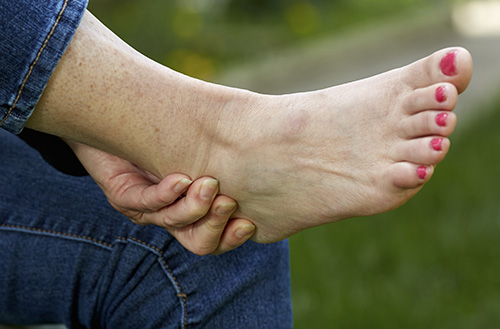Nerve Pain
In a world of 24/7 communication, the sudden realization that your phone is dead can cause a sort of mini-panic. You might miss an important text!
Within your body, your peripheral nerves are the communications network, reporting sensory information back to the brain and issuing instructions to muscles and other organs. When nerves are damaged or impaired, pain is usually one of the primary indicators, but a wide variety of side effects and symptoms are possible. That includes strange sensations (tingling, burning, freezing, etc.), muscle weakness, or even complete numbness.
Because of their size, surroundings, and position, nerves in the lower legs, ankles, and feet tend to be the body’s most vulnerable.


Types of Lower Extremity Nerve Pain
The two of the most common categories of nerve pain we see at our office include:
- Peripheral neuropathy. This refers to a range of related conditions involving systemic damage or degeneration in peripheral nerves – usually in the feet. Like any other of the body’s systems, nerves need plenty of oxygen and nutrients to stay healthy. Low blood flow and high levels of sugar in the blood starve and poison nerves, which is why peripheral neuropathy is a very common complication of diabetes. Other potential causes include alcoholism, various diseases, and dietary deficits.
- Nerve compression. In order to reach all the way from the brain and spinal column to the furthest reaches of your feet and toes, nerves must navigate around muscles and bones, and even through narrow tunnels within joints. As a result, they are vulnerable to direct pressure from external or internal sources. Repetitive motions, tight clothing, weight gain, inflammation, injuries, bone misalignments, and host of other factors can all pinch, trap, or compress a nerve.
Treatments for Nerve Pain
Unlike your phone, getting the network back online after an issue isn’t always as easy as plugging in an adapter. Nerve damage from neuropathy or compression tends to worsen with time, and the longer you wait for treatment, the more likely the damage will be permanent, at least on some level.
For mild or early-stage cases, the first step will likely be conservative. Depending on the cause of your nerve pain, conservative care may take the form of medications (both oral pills and topical creams) physical therapy, custom orthotics, or even a change in footwear.
However, in the last several years a variety of new technologies and techniques have emerged to help manage (and even cure) nerve pain better than ever before. We are proud to offer these options to our patients.
- Electrical stimulation. This extremely promising and effective treatment option uses electrodes placed on the skin to generate a gentle electric current processed by your nerves. These electric signals provide numerous benefits, including inflammation reduction, improved blood flow, and increased cellular regeneration. In some cases, as the nerve fibers get used to receiving and transmitting these signals, they can actually begin to re-establish broken connections with other nerves and improve function.
- Nerve decompression surgery. In about 70% of cases where a nerve has been trapped, decompression surgery is the treatment of choice. Once we identify the precise source of the problem (using diagnostic techniques such as blood tests, biopsies, and local anesthetic blocks), we can perform the surgery. Most are fairly quick, and you can go back to your regular activities within just a few weeks.
- Laser therapy. Our cold laser can help soothe nerve pain and boost function by reducing inflammation and improving blood flow.
- Shockwave therapy. The high-pressure waves emanated by this tool have been shown to reduce the pain felt by nerve fibers.
No one is better equipped to identify and treat nerve pain conditions in the feet and ankles than the team at the Foot & Ankle Specialists of Nevada. To schedule your appointment with us at either of our area offices, please call (702) 878-2455.
